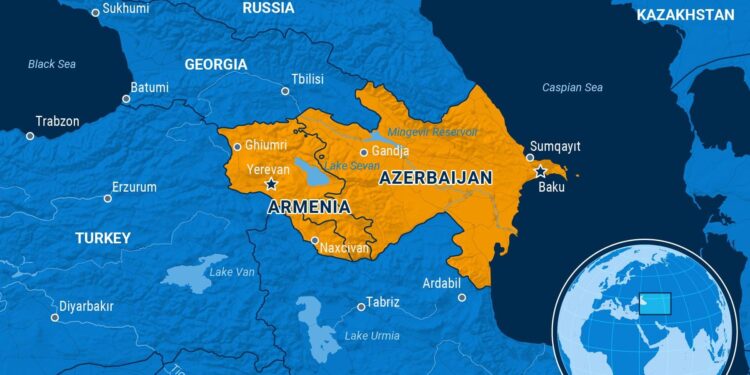A recent agreement between Armenia and Azerbaijan has sparked concern in neighboring Iran, highlighting the complex geopolitical dynamics of the South Caucasus region. Analysts warn that the deal, aimed at easing tensions following years of conflict, may inadvertently destabilize Iran’s border security and influence. This development underscores Tehran’s unease over shifting alliances and the potential for renewed instability in a strategically sensitive area, as detailed in the latest analysis by The Long War Journal.
Iran’s Strategic Concerns Over the Armenia Azerbaijan Agreement
Iran views the recent Armenia-Azerbaijan agreement with a mix of caution and strategic concern, primarily due to its implications on regional power dynamics and border security. The deal facilitates enhanced connectivity between Azerbaijan and its exclave Nakhchivan, potentially bypassing Iranian territory and diminishing Tehran’s influence over transit routes. This shift not only challenges Iran’s economic interests but also threatens to recalibrate alliances in a region where Tehran has long sought to maintain a delicate balance between its neighbors.
Key areas of Iran’s unease include:
- Security Risks: Increased Azerbaijani military presence near Iran’s border could destabilize the region.
- Economic Impact: New transport corridors may divert trade away from Iranian infrastructure.
- Ethnic Tensions: Enhanced Azerbaijani influence might embolden ethnic Azeris in Iran’s northwestern provinces.
| Aspect | Iran’s Strategic Concern | Potential Consequences |
|---|---|---|
| Border Security | Military buildup near borders | Heightened risk of cross-border incidents |
| Trade Routes | Alternative corridors bypass Iran | Loss of transit fees and regional leverage |
| Ethnic Dynamics | Empowerment of Azeri minorities | Internal instability risk |
Implications for Regional Security and Diplomatic Relations
The Armenia-Azerbaijan agreement has raised significant concerns in Tehran, where policymakers view the deal as a potential threat to Iran’s delicate position in the South Caucasus. For Iran, the normalization of relations between its two neighbors risks diminishing its influence in a region long considered a strategic buffer zone. Tehran is particularly uneasy about increased foreign investments and the possible strengthening of economic corridors that bypass Iranian territory, potentially sidelining its role as a regional energy and trade hub. The shifting alliances may also embolden separatist sentiments within Iran’s sizable Azerbaijani minority, a development considered highly destabilizing by Iranian authorities.
Moreover, the deal complicates Iran’s diplomatic balancing act between Moscow and Ankara. While both Russia and Turkey back the Armenian and Azerbaijani sides to varying degrees, Iran fears the growing Turkish influence in the South Caucasus could lead to enhanced Turkish military presence and infrastructure near its northwestern borders. The agreement could transform local security dynamics by:
- Encouraging greater Turkish-Azerbaijani military cooperation, potentially including joint air and land drills.
- Facilitating improved transport links that exclude Iran, reducing Tehran’s leverage over regional trade routes.
- Altering the security architecture in favor of greater Turkish and Russian coordination, diminishing Iran’s role as a mediator.
| Stakeholder | Primary Concern | Potential Impact |
|---|---|---|
| Iran | Lost influence and minority unrest | Heightened regional insecurity |
| Turkey | Expand strategic footprint | Increased military presence |
| Russia | Maintain regional dominance | Complex diplomatic balancing |
Recommendations for Tehran to Navigate Emerging Geopolitical Challenges
To effectively address the shifting dynamics in the South Caucasus, Tehran must adopt a multi-faceted approach that balances regional influence with pragmatic diplomacy. Prioritizing dialogue with both Armenia and Azerbaijan can help mitigate potential spillover effects of the renewed deal, particularly regarding border security and refugee movements. Tehran should also enhance intelligence cooperation with its neighbors to anticipate and respond swiftly to any destabilizing activities near its borders. Strengthening ties with Russia and Turkey remains critical, as these key actors continue to shape the regional order and can either ease or exacerbate tensions impacting Iran’s strategic interests.
Internally, Tehran should focus on fortifying economic resilience in provinces bordering the South Caucasus to withstand potential shocks from trade disruptions or shifts in transit routes. Key recommendations include:
- Expanding infrastructure investments to diversify supply chains away from vulnerable corridors;
- Promoting cultural and economic exchanges with ethnic communities in border areas to build local stability;
- Enhancing media and public diplomacy efforts to counter misinformation and assert Iran’s narrative in regional discourse.
| Strategic Focus | Immediate Actions | Long-term Goals |
|---|---|---|
| Security Cooperation | Border monitoring enhancements | Joint regional security frameworks |
| Economic Stability | Infrastructure upgrades in border provinces | Trade route diversification |
| Diplomatic Engagement | Backchannel talks with Armenia and Azerbaijan | Multi-lateral conflict resolution partnerships |
The Conclusion
As Armenia and Azerbaijan move forward under their latest agreement, Iran’s apprehensions underscore the complex geopolitics of the South Caucasus region. Tehran’s concerns reflect broader regional anxieties about shifts in power balances and the potential for increased external influence. The unfolding dynamics between these neighboring states will continue to demand close attention from policymakers and analysts alike, as the implications extend far beyond the immediate peace deal.















